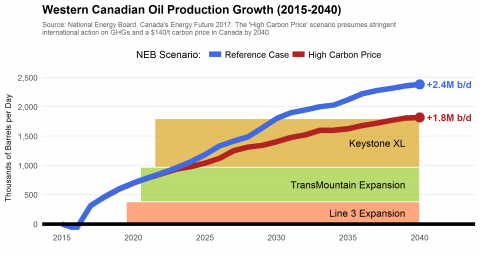From: Trevor Tombe
To: Concerned Canadians
Date: November 23, 2017
Re: Keystone XL Still Needed in a World of Stringent Climate Policy
On Monday -- nearly a full decade after it was first proposed -- the Keystone XL pipeline cleared what might be its final regulatory hurdle. Though further appeals and other challenges by opponents seem likely, Nebraska’s decision moves KXL closer to fruition.
In his Intelligence Memo earlier this week, Blake Shaffer explored some environmental implications and rightly noted that “opposition to pipelines has become a symbolic rather than practical fight.” Pipeline projects are simple to understand and highly visible, so provide a convenient opposition rallying point.
But what if substantive climate policies, globally and in Canada, become more stringent? Will Keystone XL, or other pipelines, even be needed? After all, strong action on climate change will lower demand for oil, here and abroad. It’s an important question raised by many pipeline opponents. A recent analysis by Canada’s National Energy Board may provide an answer.
In its latest Energy Future report, the NEB expects Western Canadian oil production to grow by well over 1.5 million additional barrels per day by 2030 relative to 2015 levels. Other forecasts, notably from the Canadian Association of Petroleum Producers, predict similar growth. But these are their reference forecasts. The NEB also provides a “high carbon price” scenario. It explores how Canadian energy demand and supply would change if Canada’s carbon price rose to $140/tonne by 2040 (well above the $50/tonne planned by 2022, and which is likely above the social cost of carbon) and global policy stringency similarly increased. Oil production does fall -- by 9 percent in 2040 relative to the reference case -- but the transportation capacity on Keystone XL is still necessary. To see this clearly, I plot the projected production increase against the capacity of pipelines currently in the works.
This matters. Without new pipeline capacity, increased crude-by-rail shipments will mean higher spill risks and more emissions. Worse still, Alberta producers face a steeper price discount relative to world markets. This makes blocking pipelines a very inefficient way to address climate change. And, as Blake Shaffer and I argued in another Intelligence Memo, new pipelines are not inconsistent with Canada’s climate goals.
The ongoing debate around Keystone XL, the TransMountain pipeline expansion, and other projects will continue to run hot. And while there is much scope for reasonable people to disagree and debate, we must keep in mind that stronger action on climate change is not inconsistent with support for new pipelines.
Trevor Tombe is an associate professor of economics at the University of Calgary and research fellow at the School of Public Policy.
To send a comment or leave feedback, email us at blog@cdhowe.org






